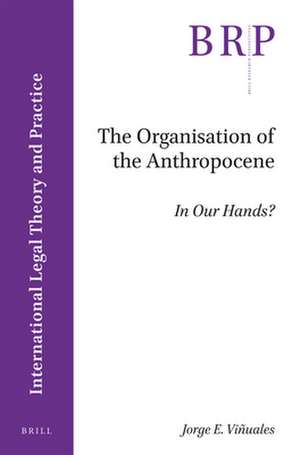The Organisation of the Anthropocene: In Our Hands?: Brill Research Perspectives in International Law / Brill Research Perspectives in International Legal Theory and Practice
Autor Jorge E. Viñualesen Limba Engleză Paperback – 11 iul 2018
Preț: 437.35 lei
Preț vechi: 518.31 lei
-16% Nou
Puncte Express: 656
Preț estimativ în valută:
83.70€ • 87.06$ • 69.10£
83.70€ • 87.06$ • 69.10£
Carte indisponibilă temporar
Doresc să fiu notificat când acest titlu va fi disponibil:
Se trimite...
Preluare comenzi: 021 569.72.76
Specificații
ISBN-13: 9789004381353
ISBN-10: 900438135X
Pagini: 82
Dimensiuni: 155 x 235 mm
Greutate: 0.14 kg
Editura: Brill
Colecția Brill
Seria Brill Research Perspectives in International Law / Brill Research Perspectives in International Legal Theory and Practice
ISBN-10: 900438135X
Pagini: 82
Dimensiuni: 155 x 235 mm
Greutate: 0.14 kg
Editura: Brill
Colecția Brill
Seria Brill Research Perspectives in International Law / Brill Research Perspectives in International Legal Theory and Practice
Cuprins
The Organisation of the Anthropocene
Jorge E. Viñuales
Abstract
Introduction
Part 1: Law in the Anthropocene Narrative
Part 2: Ingraining Nature in Law
3.1 Overview
3.2 Law Detached from Nature
3.2.1 An (Un-)Intended Consequence of Legal Positivism
3.2.2 Illustration: Conceptions of Property
3.3 The Horizon of Law in the Anthropocene
3.3.1 Hans Jonas and the Horizon of Ethics
3.3.2 The Task for Law
3.4 Revisiting Foundational Concepts
3.4.1 Transactions-Externalities: The External Logic of
Environmental Law
3.4.2 Illustrations: Conceptions of Sovereignty and Causality
Part 3: Accounting for Inequality
3.1 Overview
3.2 Legal Organisation of Production
3.2.1 Organising Production for the Industrial
Revolution
3.2.2 The Law of Business Organisation
3.2.3 Structuring Labour Relations
3.2.4 Pollution and Third Parties
3.3 Asymmetric International Exchange Systems
3.3.1 The British Atlantic System
3.3.2 The Legal Organisation of Trade
3.4 Operationalising Historical Responsibility
3.4.1 Level and Time-horizon
3.4.2 Industrialisation and the Historical Debt towards
Africans
3.4.3 The Legal Representation of Future Generations
3.4.4 Present Allocations: Common but Differentiated Responsibilities
Part 4: Legal Organisation of the Transition
3.1 Overview
3.2 Adaptive Legal Systems
3.3 Promoting or Hindering the Transition
3.4 Legitimising the Transition
Conclusion: A Research Agenda
Select Bibliography
Jorge E. Viñuales
Abstract
Introduction
Part 1: Law in the Anthropocene Narrative
Part 2: Ingraining Nature in Law
3.1 Overview
3.2 Law Detached from Nature
3.2.1 An (Un-)Intended Consequence of Legal Positivism
3.2.2 Illustration: Conceptions of Property
3.3 The Horizon of Law in the Anthropocene
3.3.1 Hans Jonas and the Horizon of Ethics
3.3.2 The Task for Law
3.4 Revisiting Foundational Concepts
3.4.1 Transactions-Externalities: The External Logic of
Environmental Law
3.4.2 Illustrations: Conceptions of Sovereignty and Causality
Part 3: Accounting for Inequality
3.1 Overview
3.2 Legal Organisation of Production
3.2.1 Organising Production for the Industrial
Revolution
3.2.2 The Law of Business Organisation
3.2.3 Structuring Labour Relations
3.2.4 Pollution and Third Parties
3.3 Asymmetric International Exchange Systems
3.3.1 The British Atlantic System
3.3.2 The Legal Organisation of Trade
3.4 Operationalising Historical Responsibility
3.4.1 Level and Time-horizon
3.4.2 Industrialisation and the Historical Debt towards
Africans
3.4.3 The Legal Representation of Future Generations
3.4.4 Present Allocations: Common but Differentiated Responsibilities
Part 4: Legal Organisation of the Transition
3.1 Overview
3.2 Adaptive Legal Systems
3.3 Promoting or Hindering the Transition
3.4 Legitimising the Transition
Conclusion: A Research Agenda
Select Bibliography
Notă biografică
Jorge E. Viñuales, LL.B. (UNICEN), LL.B. (Freiburg), BA, MA (HEI), BA, MA (Geneva), LL.M. (Harvard), PhD (Sciences Po Paris) is the inaugural Harold Samuel Professor of Law and Environmental Policy at the University of Cambridge, where he founded the Cambridge Centre for Environment, Energy and Natural Resource Governance (C-EENRG).



